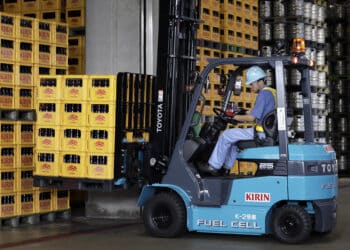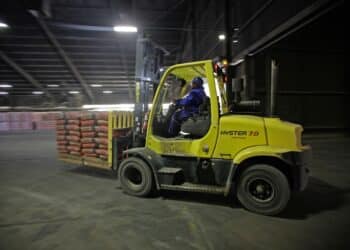Q&A with … EverBank’s vendor equipment finance team
3 leaders discuss the lender’s expansion to materials handling and more
EverBank is aiming to tap into a growing marketplace with the addition of a materials handling team to its vendor equipment finance business.
The Jacksonville, Fla.-based lender’s expanded materials handling offering positions it to finance equipment such as forklifts, railcar movers, lifts and racking. It also strengthens its role as a financing partner for manufacturers, dealers and distributors and enable faster, more tailored solutions across the supply chain.
The expansion also builds on EverBank’s vendor finance platform, which already spans health care, transportation, construction and capital markets, and reflects rising demand driven by automation, reshoring and fleet electrification. The growth of the materials handling sector presents new opportunities for lenders that can meet evolving equipment needs and structure deals for assets with unique residual profiles heading into 2026.
Members of EverBank’s vendor equipment finance (VEF) team recently shared their approach to the materials handling financing market, including thoughts on the state of the market, partnerships and credit underwriting with Equipment Finance News. What follows is an edited version of the conversation.
Equipment Finance News: What drove EverBank’s decision to expand into materials handling now, and how does this addition complement the bank’s existing vendor finance verticals like construction and transportation?
Justin Tabone, senior vice president and head of EverBank VEF: The bank’s vendor equipment finance business has been a steady source of growth and income for the bank since its inception.
With support for further accelerating growth and diversification, we identified materials handling as a segment with strong adjacencies to our existing platforms where we could execute at a high level within our current operating model.
The asset classes, transaction types and growth trajectory all made this segment highly attractive.
EFN: What is the state of the materials handling and materials handling equipment finance markets and how is the materials handling sector evolving amid supply chain realignment and reshoring trends?
Brian Wunsch, vice president and materials handling originations leader: Materials handling needs are on the rise thanks to an increase in automation, robotics and AI integration that address labor shortages.
The increase in e-commerce is driving demand for faster fulfillment, while supply chain realignment and reshoring are creating new investments in domestic manufacturing and materials handling infrastructure.
Third-party logistics providers are emerging as the largest end-users followed closely by food and beverage operations, where cleanliness favors electric engines over combustion engines.
EFN: Where do you see the greatest materials handling opportunities for EverBank and other equipment financiers heading into 2026?
BW: The forklift market isn’t only growing; it is modernizing and transforming. The dealers, manufacturers and finance companies that adapt to these trends will thrive.
The electrification of the fleets is happening at a breakneck speed. With the labor shortage, you will soon see autonomous units and driverless forklifts in the not-too-distant future. Regulations have been the primary driver, so any changes to them will affect the market.
There will always be a place for gas-powered forklifts. They will continue to be a component of the market, so lenders who can balance the growing electric forklift market with the mainstay gas units will have the strongest overall portfolio.
EFN: What role will dealer and manufacturer partnerships play in scaling EverBank’s materials handling portfolio, and how is your team structuring programs to support both sales and working capital needs?
JT: VEF partners with leading vendors in our core segments, which are our primary channel to the borrower and our origination volume. We have expanded into materials handling with this same approach by hiring a team of industry experts with a history of successful execution, which has long-standing relationships with best-in-class manufacturers and dealers.
EFN: How will EverBank’s approach credit underwriting and deal structuring differently in this segment, particularly for assets like forklifts, racking and railcar movers that have unique residual profiles?
Dan Webb, Senior Credit Officer: Our underwriting practices are fully aligned with EverBank’s credit guidance. We recognize the opportunities to extend financing when supported by strong, value-retaining collateral, particularly in cases involving long-lived assets such as forklifts and rail car movers.
We actively collaborate with dealers and customers to create financing solutions while maintaining appropriate risk management.
Register here for the free Equipment Finance News webinar “Tech-driven risk management: How innovation is reshaping equipment finance” set for Tuesday, Dec. 9, at 11 a.m. ET.









